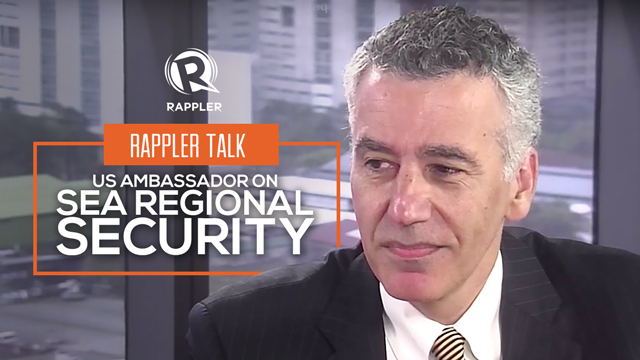
Rappler talked to US Ambassador to the Philippines, Philip Goldberg on the crisis in Iraq, as well as the United States' plans moving forward from the recently signed Enhanced Defense Cooperation Agreement (EDCA).
On June 17, Tuesday, militants led by terrorist group the Islamic State of Iraq and Syria (ISIS) pushed a week long offensive to within 60 kilometers of Iraq’s capital city Baghdad. In response, Iraq's military claimed it had driven back militants who stormed the country's main oil refinery in the town of Baiji, the latest front in the battle which is 225 kilometers north of the capital. In a televised news conference, Iraqi military spokesman Gen. Qasem Atta added the situation “is under control.” (READ: Fighting nears Baghdad as UN warns crisis 'life-threatening')
Earlier, the insurgents captured Mosul, a city of two million people, and Tal Afar, a Shiite-majority town in north Iraq lying along a strategic corridor in Syria. In his statement, Atta also claimed "most of the areas" around the northwestern city of Tal Afar are now liberated.
ISIS is the latest reincarnation of fighters from al-Qaeda-linked groups that are so brutal, al-Qaeda distanced itself from them. Goldberg said although the senior leadership of Al Qaeda weakened, groups such as ISIS Boko Haram in Nigeria have sprung up to continue the jihadist movement.
He added, Iraq is now the focal point for the transnational jihadist movement with extremists crossing borders to join in the fight. He said the crisis could be Afghanistan all over again - " Iraq already is, and already had a conflict and there was hope at the end of the conflict and when we withdrew, that it would be able to be sustained. I think there are a lot of people that have been very disappointed in the Maliki government and the way it has handled the various sectarian issues. And there clearly is a problem in Iraq that goes beyond ISIS." (READ AND WATCH: Southeast Asian recruits join jihadist ISIS)
As ambassador to the Philippines, Goldberg pushed for stronger ties between the two countries, especially in the aftermath of Typhoon Haiyan last year. In April, the Philippines and the US signed a defense deal that gives the US more access to Philippine bases and allow them to store equipment. Yet, Goldberg says the US has not yet identified the bases it prefers to use, adding the two countries will have to reach a mutual agreement on the locations. (READ: DOCUMENT: Enhanced Defense Cooperation Agreement)
He emphasizes however that the bases should help the Philippines build up its defense and boost the United States’ presence with allies in the region.
Watch the interview with Goldberg below.
[Video: Amb. Goldberg on friendships in Asia & challenges in Iraq
– Rappler.com

No comments:
Post a Comment
Note: Only a member of this blog may post a comment.